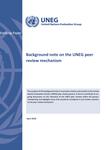Page Header

-
Evidence Summary COVID19 Food Security (2021)
1.25 MB English
-
Evidence Summary COVID19 Food Security - Annexes (2021)
798.52 KB English
Overview
The COVID-19 pandemic worsened an already fragile global food insecurity situation. In fact, alongside factors such as conflict, economic crises and climate change, in 2020, COVID-19 let to an additional 130 million people being chronically undernourished.
This study aims to contribute to a more effective UN system response to COVID-19 in the area of food security by looking at the findings, good practices and lessons learned from past evaluations of interventions to protect food security in times of crises. It presents key findings to questions that looked at the three pillars in the UN Framework for the immediate socio-economic response to COVID-19, namely interventions that support or have better supported: Social protection and basic services to ensure food security during crises; Economic response and recovery of food insecure populations in times of crises; and Social cohesion and community resilience.
The study draws three conclusions:
- Interventions that support social protection were more effective when designed as a bundle of complementary modalities tailored to the local context and specific needs of target beneficiaries, and involving adequate partnerships.
- Programmes supporting economic response and recovery of food insecure populations in times of crises were more effective when designed and implemented taking into account the realities of the context (e.g. economic, financial, infrastructural, political, environmental, social), and when they included clear scaling-up strategies with involvement of partners, private sector and political actors.
- Interventions addressing food insecurity can better support social cohesion by broadening their scope to include not only core target beneficiaries but also the most vulnerable.
The study was prepared by Patrick Breard, consultant, under the guidance of the Management Group consisting of representatives from FAO, IFAD, UNIDO and WFP. This project was funded with UK aid from the UK government and managed by UNEG. The analysis and recommendations of this study do not necessarily reflect the views of the Management Group agencies, UNEG or DfID.


